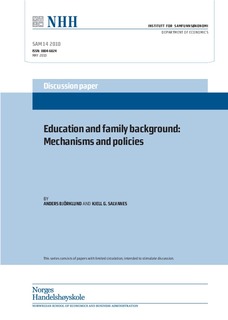Education and family background : mechanisms and policies
Working paper
Permanent lenke
http://hdl.handle.net/11250/163224Utgivelsesdato
2010-05Metadata
Vis full innførselSamlinger
- Discussion papers (SAM) [657]
Sammendrag
In every society for which we have data, people’s educational achievement is positively
correlated with their parents’ education or with other indicators of their parents’
socioeconomic status. This topic is central in social science, and there is no doubt that
research has intensified during recent decades, not least thanks to better data having
become accessible to researchers. The purpose of this chapter is to summarize and
evaluate recent empirical research on education and family background. Broadly
speaking, we focus on two related but distinct motivations for this topic. The first is
equality of opportunity. Here, major the research issues are: How important a determinant
of educational attainment is family background, and is family background—in the broad
sense that incorporates factors not chosen by the individual—a major, or only a minor,
determinant of educational attainment? What are the mechanisms that make family
background important? Have specific policy reforms been successful in reducing the
impact of family background on educational achievement? The second common starting
point for recent research has been the child development perspective. Here, the focus is
on how human-capital accumulation is affected by early childhood resources. Studies
with this focus address the questions: what types of parental resources or inputs are
important for children’s development, why are they important and when are they
important? In addition, this literature focuses on exploring which types of economic
policy, and what timing of the policy in relation to children’s social and cognitive
development, are conducive to children’s performance and adult outcomes. The policy
interest in this research is whether policies that change parents’ resources and restrictions
have causal effects on their children.
Utgiver
Norwegian School of Economics and Business Administration. Department of EconomicsSerie
Discussion paper2010:14
